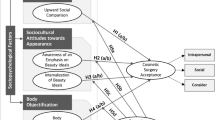Abstract
Cosmetic surgery stands, for many theorists and social critics, as the ultimate symbol of invasion of the human body for the sake of physical beauty. Interpreted as somehow qualitatively different from other efforts at altering the body, plastic surgery is considered to be so extreme, so dangerous, that it leaves no space for interpretation as anything but subjugation. While such criticisms are compelling, they tend to operate at either the grand level of cultural discourse or the highly grounded level of physiological effect. As a result, they leave out almost altogether the experience of the women who themselves have plastic surgery. This article draws from qualitative interviews with 20 female clients of a Long Island, NY plastic surgeon to explore cosmetic surgery as an occasion for autobiographical accounting and a particular kind of account of the self. Interview data suggest that plastic surgery allows women who undergo these procedures to successfully reposition their bodies as “normal” bodies. At the same time, it also requires them to create accounts that reattach the self to the surgically-“corrected”—but potentially “inauthentic”—body by invoking both essentialist notions of the self and corresponding notions of the body as accidental, inessential, or degenerated from a younger body that better represented who they truly are.
Similar content being viewed by others
REFERENCES
Bordo, S. (1990). ”Material girl”: The effacements of postmodern culture.Michigan Quarterly Review, 29, 653–677.
Dally, A. (1991). Women under the knife: A history of surgery.London: Hutchinson Radius.
Davis, K. (1995). Reshaping the female body: The dilemma of cosmetic surgery.New York: Routledge.
Finkelstein, J. (1991). The fashioned self.Philadelphia, PA: Temple University Press.
Gimlin, D. (Forthcoming). Bodywork: The business of beauty in women's lives. Berkeley: University of California Press.
Goldwyn, R. M. (Ed.) (1980). Long-term results in plastic and reconstructive surgery, 2nd edition.Boston: Little, Brown and Company.
Kaw, E. (1994). Opening faces: The politics of cosmetic surgery and Asian American women.In N. Sault (Ed.), Many mirrors: Body image and social relations (pp. 241–265). New Brunswick, NJ: Rutgers University Press.
Meredith, B. (1988). A change for the better.London: Grafton Books.
Wolf, N. (1991). The beauty myth: How images of beauty are used against women.New York: William and Morrow.
Author information
Authors and Affiliations
Rights and permissions
About this article
Cite this article
Gimlin, D. Cosmetic Surgery: Beauty as Commodity. Qualitative Sociology 23, 77–98 (2000). https://doi.org/10.1023/A:1005455600571
Issue Date:
DOI: https://doi.org/10.1023/A:1005455600571




